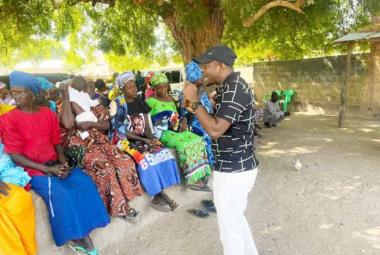By Kumba Leigh
Mental health is a state of mental well-being that enables people to cope with the stresses of life, realize their abilities, learn well and work well, and contribute to their community. It is an integral component of health and well-being that underpins our individual and collective abilities to make decisions, build relationships and shape the world we live in. Mental health is a basic human right; it is crucial to personal, community and socio-economic development.
However, it is argued that mental health is more than the absence of mental disorders. It exists on a complex continuum, which is experienced differently from one person to the next, with varying degrees of difficulty and distress, and potentially very different social and clinical outcomes. It includes mental disorders and psychosocial disabilities as well as other mental states associated with significant distress, impairment in functioning, or risk of self-harm. People with mental health conditions are more likely to experience lower levels of mental well-being, but this is not always or necessarily the case.
There have been historical and conceptual influences on the field of mental health but also discourses that show gender differences in the prevalence and clinical manifestations of mental disorders. Epidemiological findings have provided a rich resource for theory development, but without research tools to test theories adequately; findings of gender differences have begged the question of their biological, social, and cultural origins. Clinical depression is used to exemplify the usefulness of a sex and gender perspective in understanding mental illness; and major theories proposed to account for gender differences are critically evaluated.
As new analytic methods become available, it is anticipated that a more fundamental understanding of the biological and behavioral mechanisms underlying sex and gender differences in mental illness will emerge. Nonetheless, it is also likely that integration of findings predicated on different conceptual models of the nature and causes of mental illness will remain a challenge.
However, across the world, and for most African countries, women with mental health disorders are not much talked about. Taken as a whole, Africa, and America stand out as the continents with the highest prevalence of women with depression. An estimated 322 million people are diagnosed with mental disorders worldwide. In Brazil, 9.3% of the population has symptoms related to anxiety and 5.8% have depression.
The WHO 2021 Mental Health report indicates that a continent-wide study on NCDs and women in 2020, found that close to 73 million women in Africa were affected by mental health conditions and more than 25 million women by neurological conditions.
For The Gambia, according to the same WHO report 2021, Schizophrenia stood at 27.5%; drug induced psychosis 133, and at 13.2%; organic psychosis 616, at 6.8%; anxiety disorder is at 399, and at 2.5%; phobia is 326, at 1.9%; and depression 222, at 1.7% amongst others.
An estimated 322 million people are diagnosed with mental disorders worldwide. In Brazil, 9.3% of the population has symptoms related to anxiety and 5.8% have depression one in five women has a common mental health problem, such as depression and anxiety. This can be explained by socio-cultural factors linked to the female sex, which is more exposed to domestic work overload, domestic violence, domestic stressors, and multiple roles developed in society, both in the home and work contexts While there can be many reasons why these develop, some risk factors that affect many women. Women are more likely than men to be carers, which can lead to stress, anxiety and isolation.
Dr John Nute Jabang is Senior Consultant and Pediatric Neurologic Surgeon and Head of the Department of Surgery at Edward Francis Small Teaching Hospital.
On the possible causes of mental disorder in women, Dr Jabang said women go through a lot, can cause stress and affect their mental well being. He however pointed out some mental health disorders are hereditary.
Mr Lamin Barrow, Nursing Officer at Tanka Tanka Psychiatric Hospital said while there is ineffective documentation of women’s mental health, recent statistics, he said, have shown that cases of women’s mental is on the rise; that most of the diagnosis results point to puerperal-psychosis, which is related to women.
He explained that too much stress from their matrimonial households, may subject women to mental illness if care is not taken. “Out of the hundred mental health patients at Tanka Tanka , 12% of women”. Cause of mental illness among women, he said include substance abuse, mild cases of depression and bipolar or post-traumatic stress disorders.
“However, post-traumatic stress disorder is something that is generally related to many abuses done to women including sexual dysfunctions and other PTSDs. Some women are completely under harassment in their various matrimonial households and most of them are reluctant to share their stories because of the societal norms and stigma,” he disclosed.
Mr Barrow went on: “Women are sensitive and dealing with them is more likely dealing with a minor. However most of the patients are manic but notwithstanding protection measures include burglar-proofs in both wards to ensure the mentally challenged women are not abused by the opposite sex is in place.
The nursing officer said women who are brought to the hospital are properly screened to know whether or not the person is pregnant and also if there is any history of sexual harassment for a need of exclusive therapy sessions or psychosocial support.
‘‘Mentally challenged pregnant women in their prenatal and antenatal period have accessibility to effective communication, monitoring, and are attached to two female nurses.
For Tabu Njie Sarr, Women’s Rights Manager at ActionAid gender based violence is a major cause of mental disorder.
She lamented the scarcity of provisions for mentally challenged persons much especially women. She indicated that if there are no mechanisms or protective laws in place then their lives become challenging.
“There is the need to have counseling centers and adequate health facilities for women with mental health issues and measures should be in place to protecting them. We have seen instances where women are living in the streets and impregnated and you will not know who is responsible. This however leads to them being discriminated due to their condition, physical abuses, calling them names, societal stigma and rejection,” she advised.
Madam Njie Sarr suggested that the government with CSOs should come up with protective measures; that mental health legislation should be in place to help protect women and give them the right medical service and support.
“Research and data collection should be in place to keep records of women’s mental health and their root causes to ensure enhanced treatment and good health service delivery”.
An anonymous mental health victim family explained the challenges of managing their patient. ‘‘The patient gets violent at times. It can be frustrating and expensive for the family”.
Senior Program Officer, Service Delivery at Family Planning, Matty Njie on how they deal with women with mental ill health. “When they are brought to us, we first have to engage them in counseling and make them understand the long and short term contraceptives for pregnancy protection, to ensure they are protected”.
She said it is a challenge to manage patients in terms of pregnancy prevention because some of them fail to make up to appointments and that very few visit the family planning for unwanted pregnancies.







